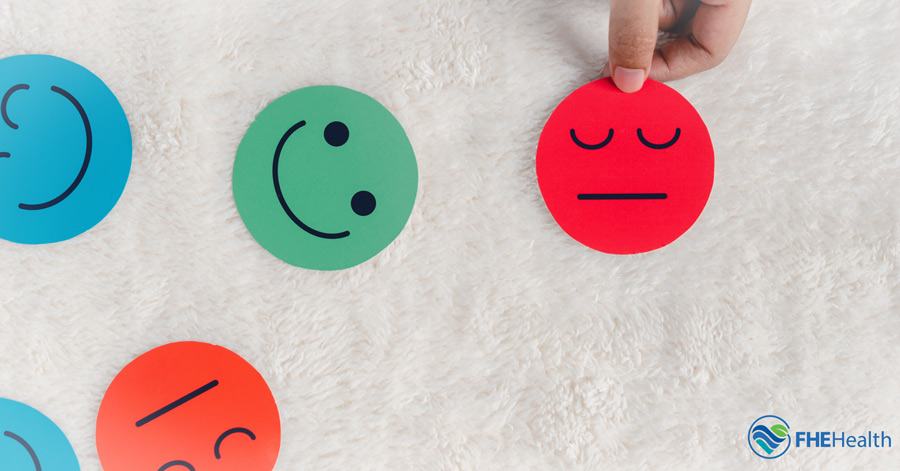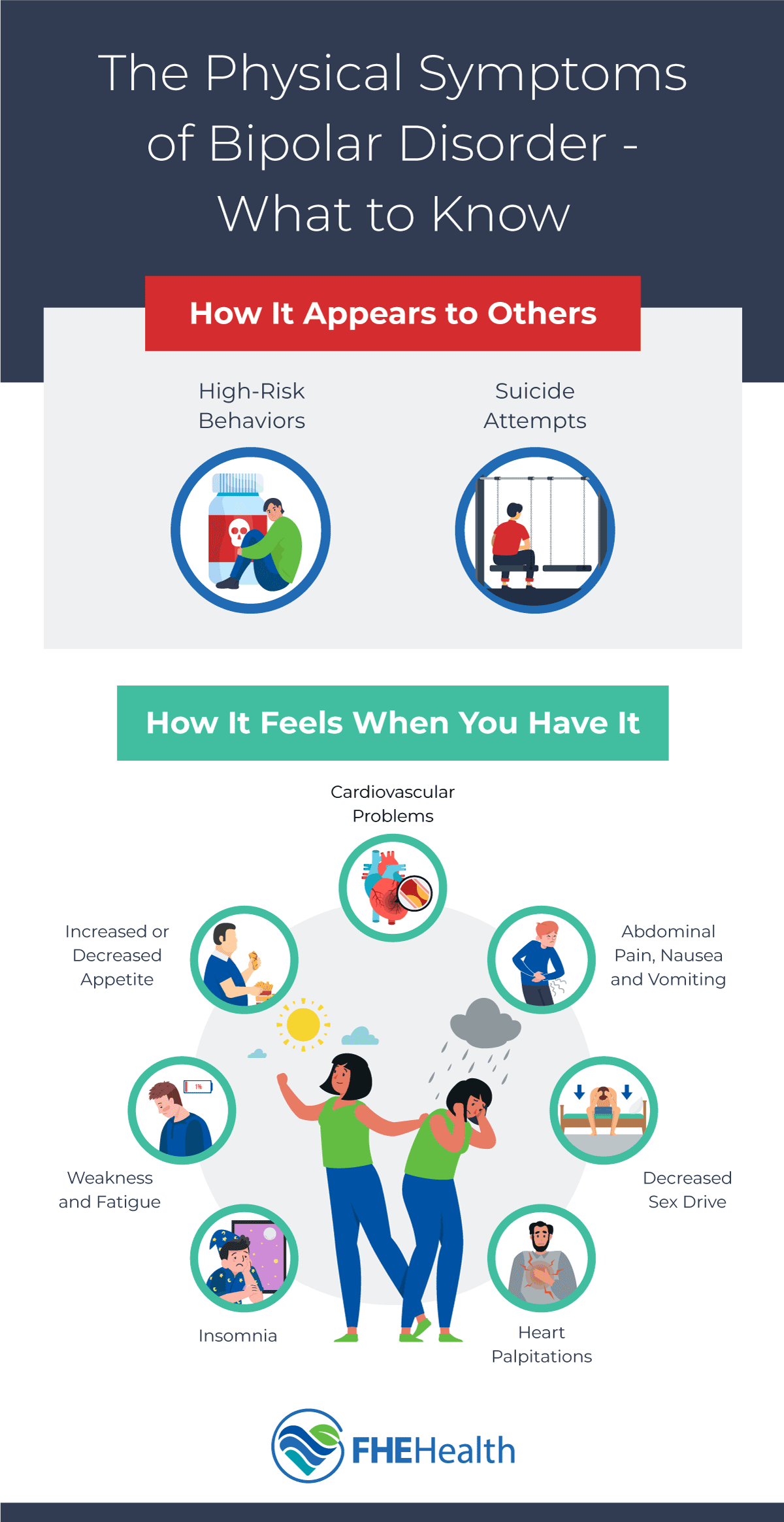
Bipolar disorder is a mental health condition, but what many people may not be aware of is that it can also involve physical symptoms. For many, mental and physical health is closely intertwined. For instance, many people who experience chronic stress will also experience physical symptoms such as stomach cramps or even skin rashes.
People who are diagnosed with bipolar disorder may also experience some physical symptoms, too. In this article, we’ll examine this condition and the physical side effects it can trigger. Fortunately, bipolar disorder and its symptoms are treatable. There are medications and therapies that can help reduce symptoms so that people can better manage this condition and enjoy a better quality of life.
What Is Bipolar Disorder?
Bipolar is a mental health disorder that is characterized by periods (sometimes over the span of months) of deep depression and manic highs. Formally known as “manic depression,” this condition can have profound impacts on a person’s lifestyle, their family and relationships, and their career. During the depressive phase of the condition, an individual might experience debilitating symptoms such as extreme fatigue and lack of motivation. They might feel hopeless or experience suicidal thoughts.
The manic phase of bipolar disorder is a period of extremely high energy. Sometimes, people feel euphoric during this phase. They can also feel restless and prone to engage in reckless or high-risk activities like drinking, using drugs, or having unprotected sex. In either case, individuals find it difficult to regulate their emotions. Between the two phases, there may be a period of “normalcy” when the individual feels symptom-free, but even these periods can involve some mental health symptoms.
Bipolar disorder is a chronic condition, but it can be effectively managed. Most people with this condition manage it with medication and psychotherapy. Following a treatment plan can help reduce symptoms and make this condition easier to cope with.
Physical Symptoms of Mania and Hypomania
Both phases of bipolar disorder can involve physical symptoms. During the manic period, also known as the mania or hypomania period, people can experience physical effects that include:
Insomnia
During the manic phase, people may have so much energy or feel so agitated that they simply can’t sleep. A person may feel so physically agitated that it keeps them awake, but their racing thoughts during this phase can also trigger insomnia.
Increased or Decreased Appetite
During periods of mania or hypomania, a person may be so busy that they simply forget to eat. Some people, on the other hand, feel an increase in appetite but may not eat healthy foods or follow their diet plan.
Weakness and Fatigue
Feeling weak and fatigued is associated with the depressive phase of bipolar, but it can also hit hard toward the end of a manic period. The lack of sleep and proper diet can result in powerful feelings of fatigue. Some people report feeling clumsy during the manic phase or near its end. It is also known that bipolar disorder is linked to loss of skeletal muscle mass over time, which can result in more intense feelings of weakness and fatigue.
Heart Palpitations
The manic phase, with its high energy, can trigger cardiovascular symptoms like heart palpitations or elevated blood pressure. This can also occur during the depressive phase if people experience anxiety symptoms as part of their bipolar diagnosis.
High-Risk Behaviors
During the manic phase, many people engage in riskier behaviors that may result in injury or even an illness. Having unprotected sex, for instance, can increase the risk of contracting an STD or other contagious illness. Drinking excessively is associated with an increased risk of falling or other injuries.
Physical Symptoms of Depression
The depressive phase of bipolar is also associated with various physical effects. In some cases, these symptoms may be even more pronounced during this period. These symptoms may include:
Fatigue
Many people find it difficult to perform normal activities during the depressive phase of bipolar disorder. Even getting out of bed can prove taxing.
Abdominal Pain, Nausea, and Vomiting
The gastrointestinal tract may be triggered and more vulnerable to upset during the depressive phase of bipolar disorder. Mental health symptoms of depression and anxiety can cause an upset stomach that becomes so severe it leads to nausea, vomiting, and diarrhea.
Decreased Sex Drive
During the manic phase, people can experience a big increase in libido. The exact opposite often occurs during the depressive phase of the condition. This can cause relationship problems for couples.
Cardiovascular Problems
The depressive phase can trigger feelings of anxiety or even panic. When these symptoms become chronic, they can have an effect on blood pressure, causing it to increase. Both the depressive and manic phases of the disorder can trigger cardiovascular problems.
Suicide Attempts
Feeling suicidal is a mental health issue–a serious one–but attempts can have a long-term or serious impact on physical health. Suicidal attempts are a complication of the condition. Clinicians will be on the lookout for signs and symptoms, but if you experience them, always report them to your doctor.
Treatment Options for Bipolar Disorder
Bipolar disorder is treatable. But since the condition varies as do its symptoms, clinicians will individualize treatment based on each person’s needs. For instance, some people may have a bipolar condition characterized by longer periods of depression. These individuals might need a different treatment regimen than patients with milder periods of depression.
Mood-Stabilizing Medication
A person with bipolar disorder should receive treatment from a psychiatrist, ideally one who specializes in treating bipolar disorder. The psychiatrist is able to prescribe medication and can provide referrals to a therapist.
Generally, treatment involves medications, which may be prescribed during both the manic and depressive phase. Clients often remain on mood-balancing medications for the long term. Over time, however, doctors may need to adjust doses or change medications depending on how they’re working.
Psychotherapy
Treatment will also include psychotherapy. Psychiatric professionals will help patients develop strategies for coping with their symptoms in healthy ways. Counseling can also help them through challenges they may be experiencing that are associated with bipolar disorder. Relationship issues, workplace stress, or other problems can be challenging during each phase of the disorder. Therapy can help alleviate some of the difficulties, providing patients with help in resolving conflict, managing stress, and managing their emotions and mood swings.
Intensive Treatment and Hospitalization
Sometimes, patients require hospitalization for more intensive therapy and monitoring. Some patients may experience detachment from reality (known as psychosis), experience suicidal thoughts, or attempt to commit suicide. When these complications occur, hospitalization is usually the safest course. Clinicians can keep patients safe until their mood becomes stabilized and they’re able to return home.
Importance of Seeking Professional Help for Bipolar Disorder
If you suspect you may have bipolar disorder or your symptoms have escalated or changed in any way, you should see your healthcare provider right away. Bipolar disorder can cause mental and physical symptoms that shift quickly. If you begin to feel more intense symptoms, you should contact your psychiatrist or doctor for advice, as you may need a change in medication or some other type of therapy. Doctors can provide treatment to reduce or eliminate your symptoms so that you remain stable and safe.
Bipolar disorder is treatable–but it must be treated by an experienced clinician who specializes in mental healthcare for best results. Contact FHE Health for a free consultation.







